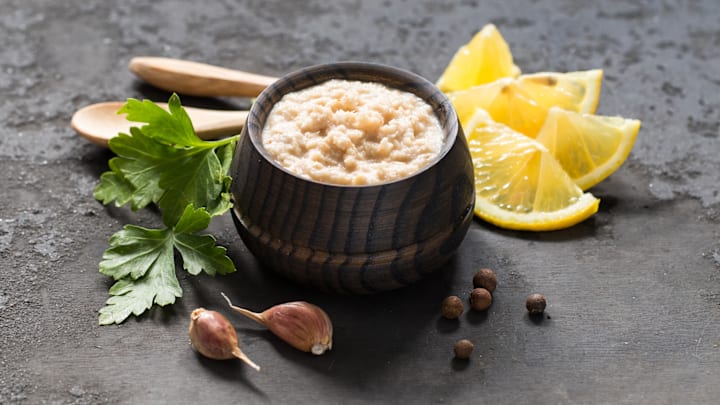Though horseradish might not be quite as crowd-pleasing as ketchup, the pungent condiment definitely has its fans. What exactly is it, though?
Horseradish is a perennial plant (Armoracia rusticana) in the Brassicaceae family, along with mustard, wasabi, arugula, cabbage, broccoli, Brussels sprouts, cauliflower, kale, turnips, and many other plants. Horseradish leaves are edible, but it’s mostly harvested for its white root, which is grated and mixed with vinegar and salt to make what’s called “prepared horseradish.”
What Is in Horseradish Sauce?

Prepared horseradish can be used on its own (more on how below) or as an ingredient in horseradish sauce. There’s no single “correct” way to make horseradish sauce, but its signature creaminess is typically achieved with sour cream, mayonnaise, or both. Other common ingredients include apple cider vinegar, chives, pepper, Dijon mustard, and Worcestershire sauce.
What Is Horseradish Used For?
A scoop of prepared horseradish is a great way to give your recipe an extra kick. As Real Simple points out, it’s often added to existing condiments, from cocktail sauce to ketchup. You might also find it in salad dressings, Bloody Marys, deviled eggs, and potato dishes.
Horseradish sauce, meanwhile, is especially popular for meat mains like steak and prime rib. But it also makes a great dipping sauce for fries, veggies, and basically any other dippable side.
Why Is It Called Horseradish?
According to one quaint but unlikely theory, the term horseradish was a translation error. The German name for the plant is Meerrettich (“sea radish”), which English speakers purportedly mistook for mare radish and eventually updated to horseradish.
Not only does this theory lack evidence, but it’s also complicated by the fact that horseradish is far from the only plant with horse in its name. As the Oxford English Dictionary explains, horse was used to denote “a large, strong, or coarse kind” of plant (or even animal). The OED cites that meaning as the origin of the term horseradish.
Have you got a Big Question you'd like us to answer? If so, let us know by emailing us at bigquestions@mentalfloss.com.
